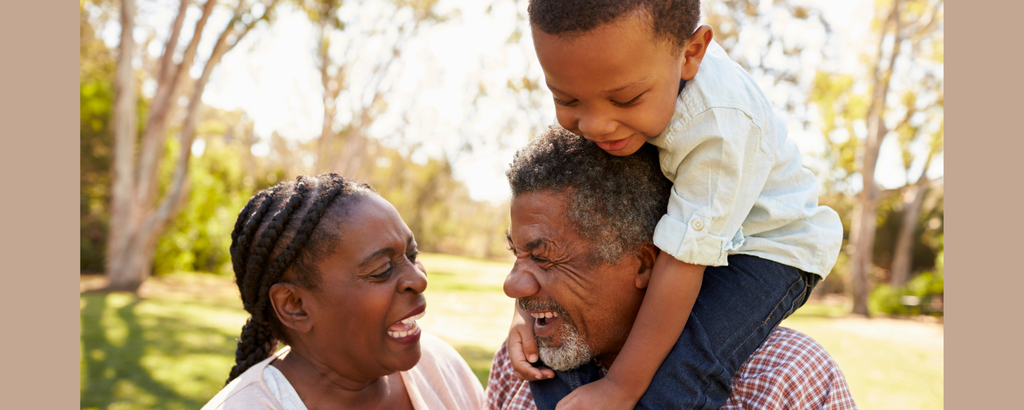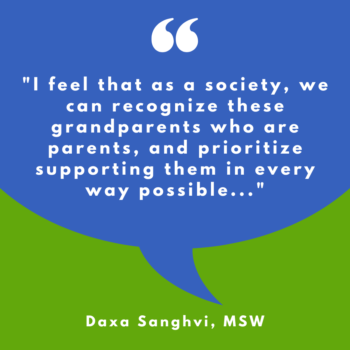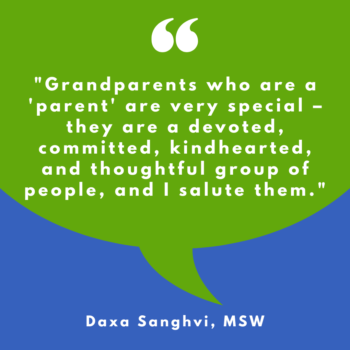
Supporting Grandparents Who Are Parenting
As part of KYC’s Caregiver Support Program, we are proud to provide a support group specifically for older adults serving as guardians, caregivers, or parents to young people.
When welcoming children into their families, many parents expect to be actively parenting for roughly two decades. For some, their years of parenting may stretch to span four decades or more, as they take on the role of “parent” for their children’s children. Taking on this tremendous responsibility to care for a second generation of children can be filled with challenges – from additional financial stress to finding it more difficult to relate to increasingly tech-savvy youth, grandparents who are raising their grandchildren have a monumental task at hand.
KYC is honored to support these grandparents and relatives who are caring for a new generation of kids. Our Caregiver Specialist, Daxa Sanghvi, MSW, shares more about our Relatives Raising Children support group, and how KYC can be an ongoing resource for families of all forms.
Supporting Grandparents Who Are Parenting
By: Daxa Sanghvi, MSW
Beginning the Relatives Raising Children Group

Since 2009, I have been honored and excited to offer monthly meetings for older adults raising children. I have learned so much from this group of special people. Some continue to attend through this day, alongside new grandparents who have also joined the group. Their consistent attendance validates that sharing ideas, learning from others’ experiences, meeting others, and bonding with them over the similar challenges and relationships they face has been significantly comforting to them.
From Grandparent to Parent
Many older adults look forward to retiring, slowing down, staying healthy, traveling, and/or enjoying their golden years.
It’s a very different scenario for a grandparent or relative raising a grandchild or another relative’s child.
Caring for a child affects them physically, emotionally, and financially. It affects their relationships with their spouse, other children, and other grandchildren.
Sometimes the child’s parents re-enter the child’s life temporarily, but due to one circumstance or another, leave again; thus requiring grandparents or other familial guardians to re-establish the child’s expectations, rules, and their schedule. These inconsistencies can affect the relationship between the grandparent and the grandchild as the child is often hopeful to have a “normal family” and may not be able to establish a strong sense of security while living with a grandparent.

For other children, they have known their grandparent almost all their lives. Either way, as the child grows, it becomes apparent to them that their situation is different from others’. Most children living with relatives have had traumatic experiences, which leaves a long-lasting impact that may be reflected in behavioral issues and learning disabilities.
The grandparents who have already raised their own children are once again committing to raising a child, ensuring that they have a loving, caring, and secure home life. It is parenting all over again. They are different from other parents in the child’s school, and they are different from other grandparents who enjoy visits with their grandchildren for only short periods of time.
Grandparents who are a “parent” are very special – they are a devoted, committed, kindhearted, and thoughtful group of people, and I salute them.
Naming and Managing the Challenges of Raising a Grandchild

Grandparents or relatives raising children sacrifice so much on a daily basis: their time, energy, and financial resources; and they do so during their senior years. As is true for many parents, grandparents raising children also sometimes neglect their own health, as their time and energy are spent managing the child’s behavior or schoolwork, while they themselves age in place. Sometimes the grandparents’ spouses have conflicting views, which can affect their marital relationships. I have observed couples who cannot make many plans together or join in each others’ activities, as one of them must be caring for the child or children. Additionally, care duties may make grandparents feel isolated, as they’re unable to meet with their friends due to time constraints; consequently, this isolation may lead to depression. Grandparents who are raising children often miss out on opportunities to have fun with other adults that most of us take for granted.
I feel that as a society, we can recognize these grandparents who are parents, and prioritize supporting them in every way possible, to sustain their efforts and allow them to take care of themselves as they care for their grandchildren. Providing some respite so that they can spend some time enjoying the activities they would like away from the grandchildren is a good start.

Recently, AgeOptions provided additional funding for KYC’s Relatives Raising Children Group, for which I am grateful. It has allowed me to plan special events and treats for this group of wonderful people. The grandparents enjoy these activities with each other, and their happiness is clearly apparent. We recently held a painting session where group participants each created a lovely masterpiece. Our next group activity was hosting a delicious lunch. One session, our group enjoyed miniature golf, where we discovered that one of our grandparents is quite a golf star! We also took our group to an escape room, where they had fun deciphering clues.
Our group has also provided meals kits for the families who attend, and they greatly enjoyed selecting and preparing their meals together. During the early days of COVID-19 when they were staying at home, our group had restaurant meals delivered to them so that they could enjoy a break from preparing meals and the cleanup afterwards; each group attendee was provided with a gift basket full of snacks and games to help them enjoy their time together. These activities not only create opportunities for grandparents to enjoy time with their families, but they encourage relationship-building among members of the group, which in turn allows them to speak more openly with one another during group sessions. Providing this social space also acknowledges that many of the programs schools and organizations host focus on parents who are much younger than the older adults in this group, which can further isolate and stigmatize older parents. Creating this special space can also provide age-appropriate activities with accessibility-accommodating events to make each group members feel included, safe, and comfortable.
Contact KYC for Support

If you are a grandparent or relative raising a child, please consider joining a support group to meet others in similar situations who can understand and support you.
The comradery among our group is so meaningful and heartwarming – I encourage you to try visiting a group session to see how it can make you feel a little better by sharing your ideas and experiences.
I wish you all the best on your journey.
Respectfully,
Daxa Sanghvi, MSW
Caregiver Specialist
Previous Article Next Article

